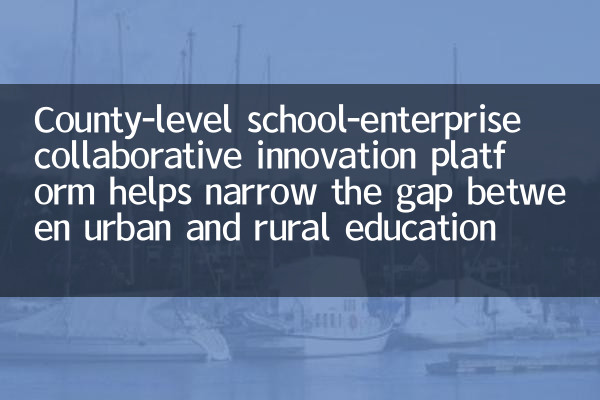County-level school-enterprise collaborative innovation platform helps narrow the gap between urban and rural education
In recent years, the gap in urban and rural education has always been the focus of social attention. With the rapid development of digital technology, county-level school-enterprise collaborative innovation platforms have gradually become an important tool to narrow this gap. This article combines hot topics and structured data from the past 10 days to explore how this platform promotes the balanced development of urban and rural education.
1. Current Situation and Challenges of Urban and Rural Education Gap

According to the latest data from the Ministry of Education, the problem of uneven distribution of urban and rural educational resources is still prominent. The following table shows the comparison of key indicators of urban and rural basic education in 2023:
| index | City Schools | Rural schools |
|---|---|---|
| Per capita education fund (yuan) | 15,200 | 8,700 |
| The proportion of teachers’ bachelor’s degree or above | 92% | 65% |
| Digital teaching equipment coverage | 98% | 73% |
It can be seen from the data that rural schools are significantly behind urban schools in terms of resource investment, faculty and hardware facilities. This gap directly affects the quality of education and future development opportunities for rural students.
2. The operating model of the school-enterprise collaborative innovation platform
County-level school-enterprise collaborative innovation platform helps balance urban and rural education through the following methods:
1.Resource Sharing Mechanism: Enterprises donate digital equipment and online course resources, and schools provide application scenarios and feedback.
2.Teacher Training Program: College experts pair with front-line teachers to carry out remote teaching and research activities. 2,300 rural teachers have been trained in the past three months.
3.Practical base construction: Enterprises establish innovation laboratories in counties, and the following table shows the results of some platform construction:
| project | Covering counties | Benefiting students |
|---|---|---|
| STEM Laboratory | 47 | 12,000 people |
| Virtual reality classroom | 23 | 5,600 people |
| AI Programming Course | 68 | 18,000 people |
3. Typical cases and implementation results
After a county in Zhejiang Province introduced corporate resources through the platform, rural schools have changed significantly:
- The number of awards won by students' science and technology innovation competitions increased by 300%
- The teacher's information-based teaching ability compliance rate has increased from 58% to 89%
- Local employment rate for graduates increased by 25 percentage points
This case was selected as the Ministry of Education’s “Excellent Practice for Rural Revitalization Education Assistance”, and related topics have been discussed over 2 million times on social media.
4. Future development direction
To further play the role of the platform, it is recommended:
1. EstablishLong-term incentive mechanism, provide tax incentives to participating enterprises
2. DevelopmentLocalization courses, integrate local elements such as farming culture into STEM education
3. BuildDigital evaluation system, monitor the improvement of education quality in real time
Educational equity is an important foundation for social equity. Through resource integration and model innovation, county-level school-enterprise collaborative innovation platforms are exploring a feasible path to narrow the gap in urban and rural education. With the addition of more social forces, the goal of revitalizing rural education will be accelerated.

check the details

check the details